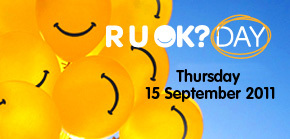Today is R U OK Day, a national day of action which aims to prevent suicide. The website states:
‘Staying  connected with others is crucial to our general health and wellbeing. Feeling isolated or hopeless can contribute to depression and other mental illnesses, which can ultimately result in suicide. Regular, meaningful conversations can protect those we know and love.’
connected with others is crucial to our general health and wellbeing. Feeling isolated or hopeless can contribute to depression and other mental illnesses, which can ultimately result in suicide. Regular, meaningful conversations can protect those we know and love.’
Staying connected is crucial not just to our individual health and wellbeing, but that of our movements and communities. Many activists struggle with feelings of isolation and hopelessness – even when surrounded by others. In the hustle and bustle of getting things done we can overlook the importance of connection, and the art of ‘meaningful conversation’.
The reminder to check in with each other is a great initiative for suicide prevention, but it can also be a useful reminder in terms of activist burnout and the emotional health of groups.
Some things you might like to try in light of R U OK day:
- Get to know the people you work with better. What’s going on in the rest of their lives? How did they end up involved in this group or campaign? What makes them tick?
- Start your meeting with a ‘check-in’ which allows people to show themselves, as well as to arrive and focus. This could involve active listening in pairs, a quick buzz in threes, a mingle of the whole group, or an opening round. You can change the prompt to explore different things. Where would you be right now if you weren’t here? Anything pulling at your focus that you’d like to mention? How are you feeling? What’s something new and good in your life?
- Acknowledge feelings. Activism can be really emotionally challenging – if we act like the only appropriate response is stoicism we leave people alone with their feelings.
- Be uncool. Coolness and pretence are the enemies of meaningful connection and closeness. The more you show yourself, the more others are likely to.
- Make time for socialising and celebrating in your group. Taking the pressure off to make decisions or carry out tasks lets a different kind of relationship develop between people. Relaxing and having fun is good for our health.
- Debrief after significant events, actions, or landmarks in your campaign. You can debrief in pairs, small groups, and all together. Allow opportunities to process what’s happened, learn, and vent so that difficulties don’t accumulate.
- Build stress checks in to your campaign planning. Do we have the capacity to do this right now? What’s the group’s energy like? Will this build momentum, or run us all into the ground?
- Keep an eye out for where people are struggling. Signs may include anxiety, perfectionism, self-criticism, disengagement, cynicism, exhaustion, anger, exasperation, melancholy, resignation… fill the gaps with your own observations.
- Check in with someone if they suddenly stop coming to meetings or turning up for actions – what’s going on for them? This may also generate some good feedback for your group.
- Don’t assume that just because someone is competent and responsible, they are okay. Sometimes the most outwardly together people feel the most alone. If you have a high achieving group member, a leader who carries more than the usual load, check in with them. How are you going? Is there anything I can do to assist you? The first answer may not be the real one.
- Get help. This could involve mentoring, counselling, health treatment, regular check-ins with a buddy from your group, support from friends and family – or a range of self-care strategies you get to figure out. For your group perhaps help from groups in a similar situation, movement elders, or an external facilitator could make a difference. A workshop on sustaining activism can be a good way to start a conversation in your group, and recognise that it’s a shared challenge.
Check out the R U OK website for tips on how to have conversations with people you are concerned about. The site includes tips for if you are concerned that someone may be suicidal, and contact details for a range of mental health service providers. If you yourself are struggling, hang in there and get help now.
If you have other ideas or resources, please share – let’s look out for each other.
